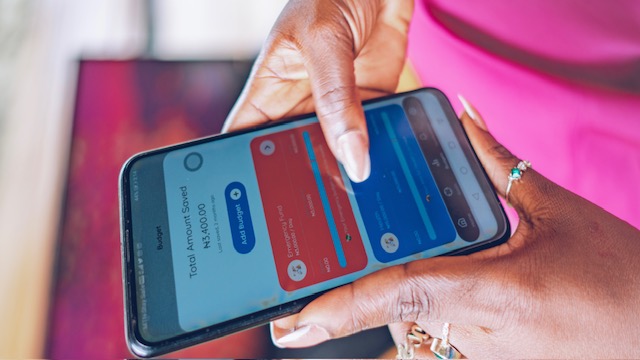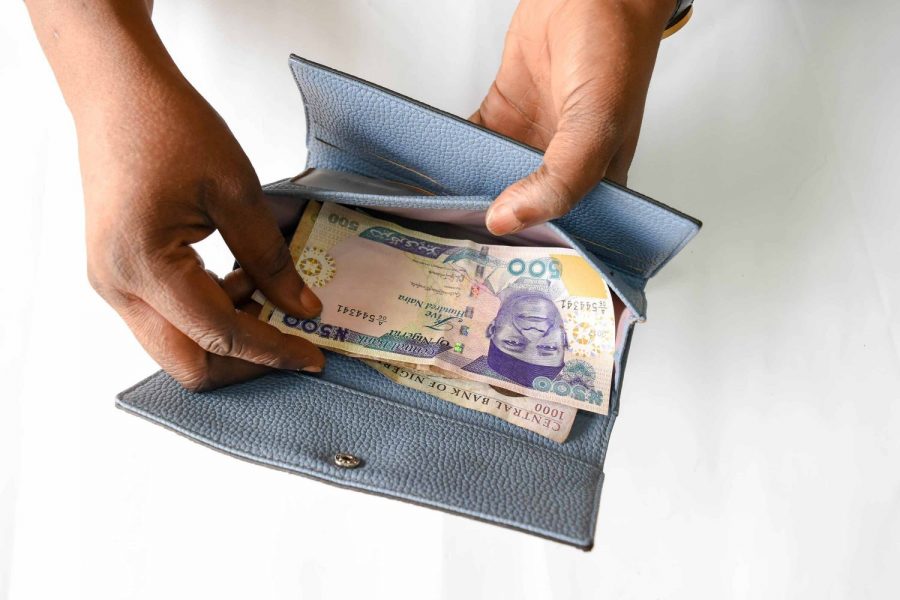Inflation is not just a big word that anyone throws around.
When I was a child, the word meant nothing to me. Watching the News with my father, I remembered hearing the word recurring in business news. But now that I am older, I not only understand the meaning of the word, but I also feel it.
A quick survey of the market and simple interviews with traders will not take rocket science for anyone to see that the price of goods and foodstuffs increased three times more than what it used to be in comparison to the same period in the year 2023 and that is the simple definition of inflation
Take tissue for example. The big-sized tissue that used to be two hundred and fifty Nara in March 2023, is now seven hundred and fifty Naira. The price of tissue paper increased three times over.
Mama Chinaza, the woman who owns the store in my neighbourhood has said that her best-selling product has moved from foodstuff ingredients to more sales of garri, (a staple made from cassava) groundnut and sugar. More people are buying only what they can afford and not necessarily what the body needs regarding a balanced diet and the right proportions of food.
Another woman Shiela Shallangwa a friend of mine on Facebook, owns a restaurant in one of the inner cities of Jos, Hwolshe to be precise. In her words,
- “As a restaurant owner, especially where my location is, I have contemplated closing twice. I sell a plate of food for 1,000 Naira. Firstly I went to restock as I buy in bulk. Rice was 78,300Naira against 60,000Naira that I bought before. Oil was 49,000Naira against 39,000Naira. The same increase was felt in other foodstuffs and spices I came back and did my calculations, for me to make gain and stay afloat, I had to sell a plate of food at 1800-2000. But given the location of my restaurant, I can’t. So I added just 200 naira and reduced the quantity. It’s not easy”.
What Changed?
To understand what changed, I decided to understand the workings of the Nigerian economy and why inflation is at an all-time high. Nigeria has struggled with inflation since 1996, but according to the National Bureau of Statistics records, this is one of the highest the country has experienced. As of January 2024 inflation rate was at an all high of 29.90%. In comparison to the year 2023, at about the same period. This means inflation increased by 8.08%.
As soon as the democratic government got into power, on June 12th 2023, one of the many policies implemented was removing fuel subsidies and floating the Naira. These policies amongst others contributed to the high rise of inflation. The cost of PMS has a huge impact on the economy as it powers the main sources of transporting goods and people from one place to another.
Despite ranking 11th out of 20 countries in terms of proven oil reserves, Nigeria does not refine the oil that it produces. The top export of the country is crude petroleum generating a revenue of $52.1b. Therefore it also imports refined petroleum products. As part of the social policies in 1977, fuel subsidy was institutionalised, and continued on all other products like diesel and kerosene. By 2016, kerosene and diesel subsidies were removed. However, the subsidy on PMS remained.
According to the World Bank, the product share of imported consumer goods that come into the country raked 45.25% of the total imported products. And these goods are moved by vehicles that are powered by PMS.
Even agricultural products rely on PMS-fueled vehicles to move products from villages to the marketplaces for sale and to customers Therefore anytime there is an increase in the cost of PMS it affects the overall cost of products and services.
For the last eight years, between 2015 and 2023, the government allowed the Central Bank of Nigeria to decide on the exchange rate. This meant that the market forces were not in charge of determining the rates. Although this did not reflect the true value of the Naira as against other currencies, it meant that businesses that imported goods could access the dollar at a lower rate that is not necessarily the true rate of the Naira and then import goods at that rate.
But now that there is a policy for the floating of the Naira, it means that the Central Bank of Nigeria can no longer control the exchange rate and is now dependent on market forces like supply and demand.
This means importers now access the dollar at the market rate, which is higher and has been fluctuating on the high side, and this will translate to the cost of products in the market. All these factors are coupled with the country’s debt payment and servicing and the printing of more Naira by the previous administration.
It was important for me to understand all that was happening and have an idea of what changed, to know if we were in a permanent condition or a temporary one. I cannot tell if this is permanent, but I know it will last a long time.
Why Is Budgeting Important?
As the prices of products, services and transportation are increasing, salaries have remained the same. A distance that used to be 250Naira on commercial motorcycles is now 500Naira. I live in a suburb of the capital city of Nigeria, and the distance from my home to the central city is
1hr 30 minutes, and neither my salary nor my income has increased.
As a business owner and financial writer/enthusiast, my income has not increased either. Patronage is on the low, money earned from sales of goods holds no more weight, as the profit margin has shrunk, and it has become increasingly difficult to restock. More people are focused on purchasing essential goods and are beginning to perceive body care and anything outside food as luxury. Civil servants, business owners, law firms and the general population are lamenting because there has been no upward review of salaries to match the increase in the cost of goods and services. Gimbiya Deborah Jatau, a civil servant said:
“it’s the same salary we’ve been left with, to cope with the ever-changing prices of goods and services. Most service providers and traders have adjusted their prices, while the civil servant is bereft of any purchasing power”
People have become desperate because they lack financial literacy and do not budget. Personal budgeting is the act of planning how you will spend your money by allocating a certain amount to use on a particular need or want, and following that plan strictly. Therefore they have resorted to borrowing money from loan sharks.
More mean, hateful and defaming text messages are now a new norm to wake up to, as popular loan sharks have devised the method of defaming the character of their borrowers to all their contacts, to shame them into paying up.
I realised that the purpose of budgeting and planning is to arm myself so that I do not fall victim to loan sharks and emergencies that I am not prepared for. Budgeting on my income, helps me to separate needs from wants and also set aside funds for emergencies.
What Are The Various Methods Of Budgeting?
There are different methods to allocate one’s money or income in the order of priority or in the order of what is important. Just like health goals, budgeting goals are personal and dependent on individual needs.
Choosing the right budgeting method may seem overwhelming, but you can know which is best for you by asking salient questions; Is it to pay bills on time? To change a spending habit? To plan for retirement or to pay debts? These are important questions that you need to ask yourself to choose the method that is tailored to your needs. Once you can answer this question you can choose from any of the methods below.
- The traditional method of budgeting: is probably the most popular method, when people earn their income, they subtract utility bills, debt payments, money for foodstuff and then whatever is left is used for savings, chilling and black tax.
- Goal-Based Budgeting: Goal-based budgeting is when you have a set of goals that you want to meet, and you set aside money to service those goals. For example, if I want to buy a car, I will say 20% of my monthly income should be towards that purpose.
- The Envelope Budgeting: This method is for merchants who trade with physical cash. The envelope method allows them to put different amounts of money into various envelopes, labelled for different needs and used only for what is in each envelope.
- The 50-30-20- Rule for budgeting: this is my favourite budgeting method because it is flexible enough to change into any proportion I desire. It simply states that 50% of your income goes to the necessary things, 30% to the things that are not necessary, but you need them, and then 20% to savings.
What Tools Do I Use For Budgeting?
I am an old-school woman who likes to hear the scratch of pen on paper. Therefore I love to write my goals and budget. However, what I have learned, Is that I hardly stick to these goals, and soon afterwards, I am touching money set aside for a specific thing for something else.
My inability to stick to my budget is not the only challenge. Saving is also a challenge. Whenever I need money for daily activities like transportation, water, and data, I find myself taking out money from my savings and using it for my daily activities. Even when I use apps that fine me for premature withdrawal of locked funds, I find that I don’t mind paying those fines. It is even worse that I have to occasionally deal with black tax and unforeseen health emergencies from ageing parents.
So I began to search for a tool that would help me automate the budgeting process, set aside funds for day-to-day activities, and enable me to have funds saved for emergencies and future assets. My search was not long, because I found the Everydaymoney budgeting app.
Upon downloading from Play Store, the first page had different variations of the 50-30-20 budgeting rule that is tailored in proportions to meet the financial goal of the user. Some of the budgeting templates were 80-10-10, where 80% of income is for spending, 10% for saving and 10% for emergencies.
The best part is that this template can be adjusted and personalised. The User does not need to do a thing after choosing or personalising the template, because all processes and disbursement are automated.
The economy is still the way it is, my income has not increased but I have money set aside for daily spending, necessities, black tax, and emergencies. And now, I can save. Everydaymoney has enabled me to develop the habit of sticking to my budget because that is how I can survive.














.gif)




